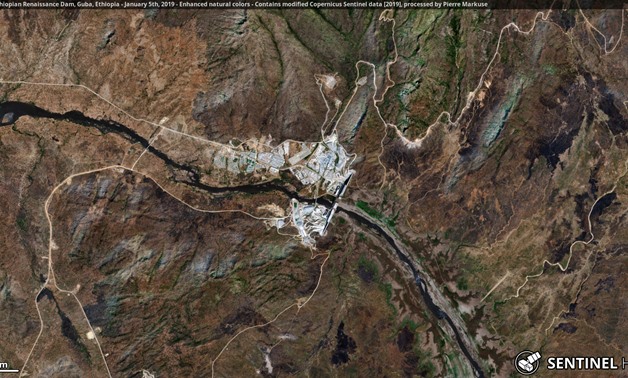
Grand Ethiopian Renaissance Dam, Guba, Ethiopia- CC via Flickr/Pierre Markuse
CAIRO - 8 May 2020: Egypt has sent a letter to the members of the United Nations Security Council on the latest development of the controversial Grand Ethiopian Renaissance Dam (GERD) file, said Egyptian Foreign Ministry spokesperson Ahmed Hafez in a statement.
In a phone call with his Estonian counterpart Urmas Reinsalu, whose county assumes the UNSC presidency this May, Egyptian Foreign Minister Sameh Shoukry referred to the letter he recently extended to the council members on stages of tripartite negotiations between Egypt, Sudan, and Ethiopia, besides Egypt’s flexible positions which are consistent with the rules of international law, Hafez said in a statement on Wednesday evening.
The phone call tackled “the necessity of Ethiopia's positive engagement in order to settle this file in a just and balanced way for the three concerned parties, so as to guarantee the sustainability of security and stability in the region,” the statement said.
“The Estonian Minister expressed his aspiration for close cooperation with Egypt in the framework of Estonia's membership in the Security Council and its assumption of the Council’s presidency this May, in order to support international peace and security, in view of the positive role played by Egypt in this regard at the regional level, whether in the Middle East or in Africa, stressing Estonia's eagerness to raise the issues of common concern during the Security Council deliberations,” the statement read.
Late February 2020, the US, WB-brokered talks between Egypt, Ethiopia, and Sudan reached a deadlock after Ethiopia abstained from attending the meeting.
Ethiopia had announced at that time that it would continue to build the Renaissance Dam and fill the reservoir, regardless of the interests of the other countries. The Ethiopian announcement came in response to an American statement, which emphasized that the final trial and the filling of the Renaissance Dam's reservoir should not be carried out without reaching a joint agreement among Ethiopia, Egypt, and Sudan.
Since then, Egypt diplomatically has been lobbying against the Ethiopian intransigence concerning the dam issue; Egyptian Foreign Minister Sameh Shoukry made European and African tours to discuss the file of the Ethiopian dam with a number of world leaders.
On March 21, 2020, Egyptian Minister of Water Resources and Irrigation Mohamed Abdel-Atti said that Ethiopia aims to impede reaching an agreement on the rules of operating the dam and filling its reservoir with the Nile water.
In an interview with the “DMC Evening” talk show on the DMC channel, the minister added that Egypt has asked Ethiopia to not fill the dam’s reservoir with water during the drought period or to allow small quantities of water to not cause harm to Egypt’s share. However, he added, the Ethiopian side does not want to abide by any commitments, saying “we have given ultimate flexibility.”
The difference between Egypt, Sudan, and Ethiopia dates back to May 2011 when Ethiopia started building the dam; Egypt voiced concern over its water share [55.5 billion cubic meters]. Three years later, a series of tripartite talks between the two countries along with Sudan began to reach an agreement while Ethiopia continued the dam construction.
In 2015, the three countries signed the Declaration of Principles, per which the downstream countries [Egypt and Sudan] should not be negatively affected by the construction of the dam. Since then, the talks have been resumed, but In October 2019 blamed Addis Ababa for hindering a final agreement concerning a technical problem, calling for activating the Article No. 10 of the Declaration of Principles, which stipulates that if the three countries could not find a solution to these differences, they have to ask for mediation.

Comments
Leave a Comment